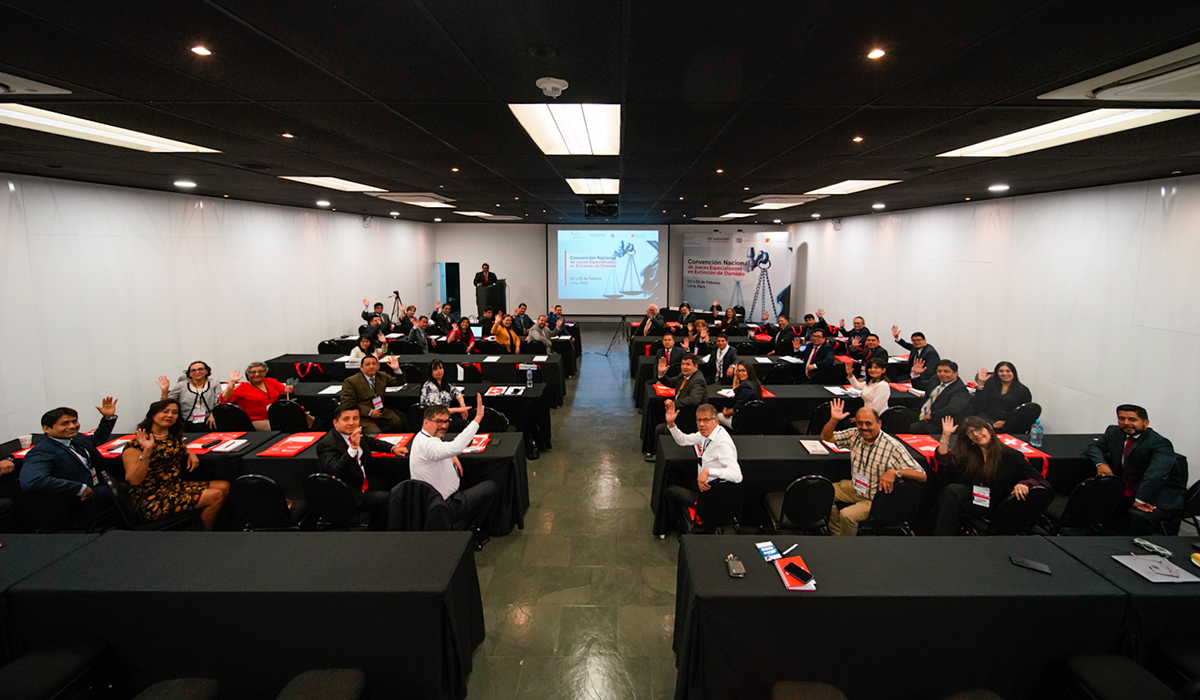Judges’ convention shows why Peru is a leader in recovering proceeds of corruption through non-conviction based forfeiture

The head of Peru's Judiciary, Javier Arévalo Vela, has publicly highlighted Peru's success in recovering the proceeds of corruption and related financial crimes through its non-conviction based forfeiture law, Extinción de Dominio.
The subsystem Peru has rolled out to implement the law "allows the state to recover money from cases of corruption, money laundering and more" he said. Around USD 64 million have already been recovered, with many more cases in the pipeline.
National Convention of Judges
Mr Arévalo Vela was speaking at a two-day National Convention of Judges Specialised in Extinción de Dominio, organised with the support of our Subnational Public Finance Management Strengthening Programme, which is funded by the Swiss SECO Economic Cooperation and Development programme in Peru.
The convention was a working event, with the aim of harmonising the understanding and practical application of the law across Peru’s decentralised Extinción de Dominio tribunals. Thanking the Swiss SECO Cooperation and Basel Institute for their support, Mr Arévalo Vela said:
"Events such as this one foster knowledge and exchange of ideas among judges. The outcomes of this convention will be positive in terms of exchanging ideas and unifying criteria, and above all in terms of shaping the future of this subsystem.”
Stefano Vescovi, Deputy Head of Mission at the Swiss Embassy in Peru, welcomed the participants on behalf of the Swiss Government, emphasising that:
“We are pleased to have representatives from the regions of Peru and hope that this event will contribute to the efforts of the Peruvian judicial authorities in the process of implementing the asset forfeiture subsystem. Through the Subnational PFM Programme, we support Peru’s justice institutions in the process of asset recovery in favour of the Peruvian State and in strengthening the competences of practitioners to tackle organised crime, corruption and money laundering.”
Success factors
As Oscar Solórzano, our Head of Latin America, said in opening remarks:
“Having supported Peru before and during the establishment of the subsystem, we are proud to see the profound advances and its consolidation in recent years. Peru is an example in the region as the only country tackling international asset recovery cases.”
The success is in large part due to the work of the judges, Oscar stressed, but also due to the high level of political will in Peru to introduce and apply the Extinción de Dominio law in major corruption cases.
The convention also illuminated some of the other factors that have made Peru a leader in the use of Extinción de Dominio legislation to recover the proceeds of corruption:
1. Motivated prosecutors and judges eager to learn from their peers
The key success factor is the talent and commitment of prosecutors, judges and others to investigate and prosecute corruption and money laundering cases and to recover the proceeds of these crimes.
Such cases are incredibly complex and can take years to unravel, never mind the challenges of international cooperation.
The judges at the National Convention stressed the utility of meeting and sharing experiences with their peers. Prosecutors at the 2022 National Convention of Specialised Prosecutors made similar remarks.
Peer learning is the principle behind the Basel Institute’s Asset Recovery Knowledge Community in Latin America, which brings together practitioners and academics from across the region.
2. The law itself, aligned with applicable human rights standards
Of the different models of non-conviction based forfeiture law that exist in Latin America, the Extinción de Dominio model adopted by Peru and several other countries is arguably the one most aligned with a human rights focus.
As Oscar Solórzano has argued, a human rights-based approach to developing and implementing non-conviction based forfeiture laws is essential. This will help to fireproof them against claims that they violate rights such as procedural rights and the right to property, and are therefore unconstitutional.
Some of Peru’s landmark cases, such as the Russian arms dealer case, the case of General Malca Villanueva and the terrorist financing case of The Nun (La Monja), demonstrate clearly that such laws can be applied with proportionality and in full respect of the rights of the defendants.
3. Proactive international cooperation
Most corrupt proceeds do not stay within the country but are laundered and hidden in international financial centres. This makes international cooperation crucial to the success of asset recovery proceedings.
As Peruvian Prosecutor Hamilton Castro stresses in this interview, international cooperation is complicated by the fact that different states have different legal systems. Some do not recognise non-conviction based forfeiture and are unwilling to provide mutual legal assistance.
Peru’s cooperation with foreign partners on such cases has improved significantly with the help of the Basel Institute’s advisors. It is also the only Latin American country so far to have enforced asset confiscation orders based on its non-conviction based forfeiture law in foreign jurisdictions.
In December 2020, for example, it signed a trilateral agreement with Switzerland and Luxembourg regarding the repatriation of over USD 26 million to Peru.
Inspiration?
We are pleased to have supported both the drafting and enactment of the Extinción de Dominio law in 2018 and its implementation since then, through our Subnational PFM Programme and our International Centre for Asset Recovery.
We hope Peru's experience will inspire other states seeking to ensure that corrupt individuals and money launderers are not able to enjoy the proceeds of their crimes.
Learn more
- See the Peruvian Government press release (in Spanish).
- See the news and more photos on our Programa GFP website (in Spanish).


